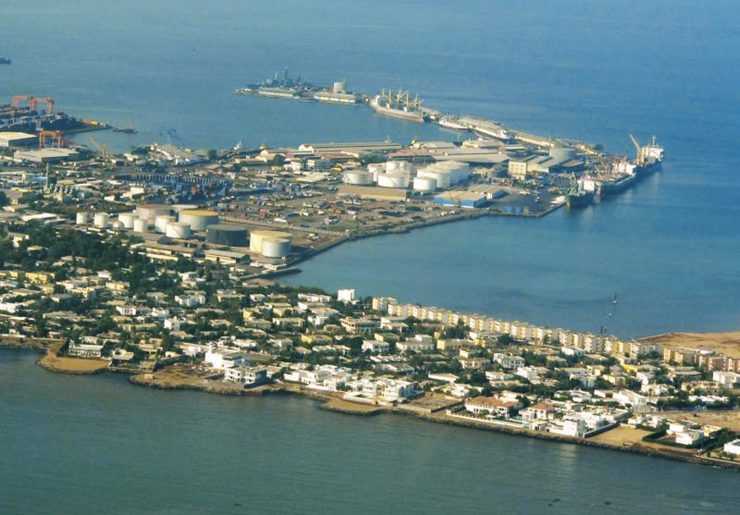
What’s all this interest in Djibouti of late? The tiny territory of only 23,000 square kilometres is now in the middle of a tectonic shift in world and regional politics. The ongoing quest by powerful nations to dominate the Indo-Pacific region is now extended to East Africa’s shores, and tiny Djibouti is the focal point in the geopolitical competition.
Djibouti’s location overlooking the Bab al-Mandab Strait that connects the Indian Ocean via the Gulf of Aden to the Red Sea and the Mediterranean is critical to understanding why the great powers are again focused there. You see, about 15% one-fourth of all the commercial trade in oil to Europe passes Djibouti. Add to this, the undersea cable that transmits data between three continents runs out of the country. And finally, Djibouti’s over three hundred kilometres of seafront mean the country is the conduit for 95% of its landlocked neighbour Ethiopia.
For those not versed in the importance of geostrategic spots in the world, the economic security of the world’s most populous regions depends on free passage through the Bal ab Maba Straight connecting the Gulf of Aden and the Red Sea and, ultimately, the Suez Canal. In short, this small country weighs in mightily heavy for a nation that ranks 171st on the Human Development Index. The good news in this, however, is the potential for growth and development there. The byproduct of investments in such growth means a geometric shift in influence for whichever nation(s) can befriend the nation of less than one million people. This is why some of the world’s most powerful militaries are camped all about Djibouti, providing excess stress into a powderkeg of conflicting interests.
In early October 2023, The French Foreign Legion sent the 3rd Squadron of the 1st Foreign Cavalry Regiment (1er REC) to Djibouti to bolster the 13e Demi-Brigade de Légion Étrangère stationed there. This is the last Foreign Legion contingent still stationed on the African continent. The United States still uses Camp Lemonnier, which the French abandoned. The country hosts the only overseas Chinese support base and the only overseas Japanese military base. The Italian National Support Military Base is also located in Djibouti. Russia and Turkey also seek military bases in Ismaïl Omar Guelleh’s country. And with Israel’s campaign of obliteration in Gaza, seismic tremors are now shaking up the security architecture of the nations of the Horn of Africa.
Adding further friction to the already mercuric situation is that Middle Eastern powers have accelerated moves to dominate the region. But it’s the U.S. presence that is most concerning. Late last month, US Defense Secretary Lloyd Austin President Ismail Omar Guelleh to discuss what imperialists always discuss, “mutual security” interests. During Austin’s visit, it should be noted that he visited US forces at Camp Lemonnier. He also said Djibouti is “critical” in the fight against violent extremism in the continent.
Meanwhile, President Guelleh was at the 15th BRICS Summit in Johannesburg, emphasising stronger BRICS-Africa ties and courting inclusion in the rapidly expanding international group that will dominate world commerce by 2050 (Economist Jim O’Neill). The BRICS, which already control nearly 30% of the world’s commerce, will expand to include Argentina, Egypt, Ethiopia, Iran, Saudi Arabia, and the United Arab Emirates in 2024. In addition, thirty or more nations are potential future BRICS members. This is another reason Djibouti is becoming a keen focal point. China’s investments there, the Belt and Road initiative, and recent news of a competing corridor punctuate the tiny African country’s geostrategic importance.
The announcement that an India-Middle East-Europe Economic Corridor, or IMEC, is in the works complicates (Voice of America-is banned in Russia) the situation. The IMEC seeks to connect India with several Arabian Gulf countries in the Middle East and Europe through a trade corridor consisting of ports, a railway and better roads. The EU is also in the game to compete with an expected €300 billion in public and private funds by 2027 to help fund the so-called Global Gateway system.
Bottom line. Expect things in Djibouti and its neighbouring states to heat up significantly as the Ukraine/Russia conflict winds down and because of the vile Israeli onslaught on Gaza. The balance of power in the Middle East is once again crucial to many internationally important plans for many nations—more on the prospects and pitfalls for Israel and the US next time.
Phil Butler, is a policy investigator and analyst, a political scientist and expert on Eastern Europe, he’s an author of the recent bestseller “Putin’s Praetorians” and other books. He writes exclusively for the online magazine “New Eastern Outlook”.